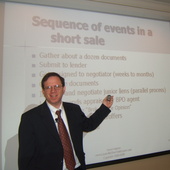Lenders push houses to foreclosure by demanding short sale offers to be 10% to 30% higher than market value.
It’s a mystery.
We can send the lender the electronic log from the lockbox to prove that 20 or 30 agents showed the house and that we got the highest offer the market will pay.
We can send them comparable sales showing market value. We can show the banks the long days on market and all the comparable listings that never sold.
Somehow the lender overrides reality.
Foreclosures Cause Values To Spiral Down. Short Sales Reduce The Lender's Losses.
- The lender dooms the house to foreclosure rather than accepting a logical short sale. That causes more blight in the neighborhood, which brings values further down, which causes more future foreclosures.
- Many articles and studies have been published that lenders lose much more in a foreclosure than in a short sale. Foreclosure resale prices further bring down the prices in the neighborhood, causing more future foreclosures.
- A foreclosure also means that the hardworking borrowers who lost their house will be shut out of the buyer pool for many years longer than if they completed the short sale. The banks are diminishing the future buyer pool, which will prolong the foreclosure crisis by many years.
- Yes, the banks lose money when they approve a short sale, but they lose much more in a full foreclosure. This can be shown time after time.
Does Any One Know Why The Banks Prefer Foreclosures Over Short Sales?
Are the lenders dooming houses to foreclosure out of corporate inefficiency or is it a deliberate strategy?
Does any one know? Please share your knowledge here so we can understand.


Comments(16)